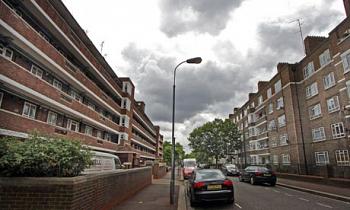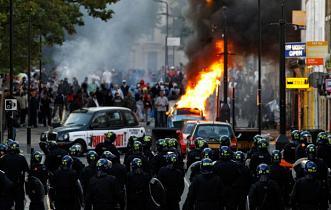Ponder, for a moment, the second-most unequal country in Europe. Its prime minister, who failed to win an outright majority, heads a government whose cabinet contains several millionaires, and embarks upon an ideologically driven economic policy against almost all international and professional advice. It has just faced its largest strikes for decades. Its lawmakers were recently found fiddling their mortgages en masse. Its press was caught phone tapping hundreds of private citizens and politicians, with little hindrance from the police.
Meanwhile, members of that police force had killed a bystander at one protest, and were criticised for violence and intimidation at another. Then, they shot a man, it was wrongly claimed that he'd shot at them first, and young people across the country rioted, setting fire to police cars, attacking police stations, looting high streets and retail parks. After that, courts worked through the night; in Manchester, a mother-of-two got five months for accepting a looted pair of shorts from a friend and a young man got six months for pinching a bottle of water. Finally, these young people's families started to be issued with eviction orders from their social accommodation; a form of housing which said government had already committed itself to dismantling. The prime minister claimed this would help break up criminal gangs.
Put like that, the UK sounds much like what the rest of the world must surely see us as, by now – akin to some post-Soviet Republic about to undergo a "colour revolution'" maybe, or a Mediterranean ex-dictatorship convulsed by civil unrest. Imagine the fundraisers and the Facebook declarations of solidarity were it so.
Yet instead, disturbingly, all these events have been disassociated in many people's minds, with the all-encompassing and highly public corruption and violence of the last few years forgotten (or worse, forgiven) after four days of hardly unconnected, albeit incoherent and indiscriminate, unrest. Yet, even if we acquiesce in the claim by the government and many others that last week's rioting was solely a bizarre, inexplicable explosion of "pure criminality", we should note that criminals are still subject to the rule of law. In a democratic country, if a youth is convicted (let alone suspected) of burgling a shop, it would be all-but-unprecedented for his or her family to be made homeless as punishment. Yet that is what is happening, with Wandsworth council starting the ball rolling and many other councils promising to follow suit.
On one level, it exemplifies that failure of the most basic social understanding that at least helped trigger these riots. The idea seems to be that those in social housing could just find somewhere else, they could just walk into private housing. Like the similar proposals for taking away housing benefit from miscreants, it is based on an inability to imagine what poverty is like, to think for a second what might happen to a family when it loses its income or its home. Given that the riots were largely concentrated in areas where extreme wealth and poverty rub up against each other – from Clapham to the Thames Valley, from Manchester to Bristol – it shows the total mutual incomprehension that we have for our literal neighbours. On another level it is of dubious legality – for a council tenancy to be rescinded, the tenant has to have been convicted of an offence on or near the premises, not always the case in these highly mobile riots; and given that so many of the rioters were minors, their parents will be those being evicted. There's a term for this – collective punishment. It is illegal under international law.
It fits very neatly, however, into a wider agenda on public housing, which is already an emergency remnant of a once-proud institution. The coalition sets time limits on council tenancies and freezes the already meagre levels of social housebuilding; Labour councils embark on massive demolition programmes of large estates and their replacement with developer-led mixed private and supposedly affordable estates. Both have much the same effect – removing the "undeserving" poor from highly profitable inner-city sites.
This is an intensification of that already existing agenda. Knowing that many of the thousands of young people who rioted were living on estates, their expulsion can free up some more space, clear that overstretched waiting list a little. It will make our cities even more Balkanised and unequal, and it will make the young even more dispossessed and angry. Brutal as these proposals may be, they are hardly inconsistent. Like the long-predicted riots themselves, they have not come out of the blue.
• This article was amended on 17 August 2011. Referring to the case of Mark Duggan, it originally stated that the police 'wrongly claimed he'd shot at them first'. In fact, it was the Independent Police Complaints Commission that made this claim. This has now been corrected.
internet site reference: http://www.guardian.co.uk/commentisfree/2011/aug/16/evict-rioters-families















